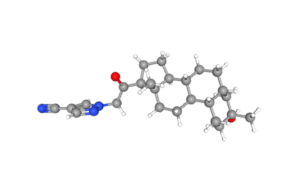
Zuranolone molecule image from PubChem
FDA’s approval of Zurzuvae for PPD could mark a significant shift in the fight against postpartum depression (PPD). On August 4, the agency gave the green light for the oral medication, although it declined its use for major depressive disorder (MDD), citing insufficient evidence of effectiveness.
The former approval represents a milestone as the first ever FDA-authorized oral medication specifically for PPD, a condition estimated to affect one in five new mothers.
Still, the rejection for MDD, which affects more than 21 million American adults, sent Sage’s stock valuation reeling. In early afternoon trading, SAGE shares were down 52.24% to $17.24. In contrast, Biogen stock was up 0.47% to $270.19.
Sage’s optimism for Zurzuvae in PPD treatmentt
In a business update call, CEO Barry Greene attempted to accentuate the positive. “We’re excited about the opportunity and believe we have a strong business case,” he said. “We have many tailwinds that may help us in launching Zurzuvae for the treatment of women with PPD.”
The company wouldn’t share plans for the drug’s pricing, indicating that it will have to re-engage payers to get more clarity. Greene stressed the importance of market access. “We must make Zurzuvae accessible,” he said. “We’re committed to the goal of rapid and equitable access to Zurzuvae for the hundreds of thousands of women who live with PPD.”
Sage grapples with MDD rejection

Barry Greene
While upbeat on the PPD approval, Sage is disappointed that they are unable to help MDD patients right now. “We’re extremely disappointed for patients with MDD, and we’re devastated that we’re not able to help them right now. We actually do not agree with the FDA’s view on Zurzuvae for MDD,” Greene noted.
If the drug had notched an approval for MDD, it would have likely significantly altered the MDD treatment landscape. The drug’s quick-acting effect and two-week course of treatment prescription would make it stand out from the crop of traditional antidepressants, which are used daily and often are slow to act.
Greene said the company was surprised by the FDA decision for MDD. “We started the rolling submission earlier this year with some of the modules in the clinical section where we had what we believe was six of seven placebo-controlled positive clinical studies as part of that package, which we believe was supportive for both PPD and MDD,” he noted.
Following the negative MDD coverage decision, Sage is mulling a pipeline prioritization and a workforce reorganization plan.
Safety considerations
The FDA has also mandated a black box warning for Zurzuvae, underscoring the risk of impaired ability to drive or engage in other potentially hazardous activities for 12 hours after administration. The drug, a neuroactive steroid, has central nervous system (CNS) depressant effects.
In addition to CNS depressant effects, the agency also notes that the drug may have potential risks associated with suicidal thoughts and behaviors and embryo-fetal toxicity.
The company expects Zurzuvae to be commercially available in the fourth quarter, and the first sales could earn Sage a $75 million milestone payment from Biogen.
Approval for postpartum depression
Zurzuvae PPD approval was based on data from two phase 3 trials, SKYLARK and ROBIN, which gauged its efficacy and safety in PPD patients.
Both studies met their primary endpoint, significantly reducing depressive symptoms based on the Hamilton Depression (HAMD) rating scale at day 15 relative to placebo. In PPD clinical trials, zuranolone also had a rapid onset of action, with improvements observed in as little as 3 days, and sustained efficacy over the 45-day study period.
Sage expects the drug to be available in the fourth quarter of 2023 following DEA scheduling. The company believes the agency will classify it as a Class-IV drug, a category that includes benzodiazepines.
Truist analysts on the zuranolone updates
Truist analysts noted the challenges in understanding the gamma-aminobutyric acid (GABA) mechanism of action (MOA) for depression, stating, “Based on multiple failed [phase 2] and [phase 3] studies, not just from Sage but also from several other biotechs evaluating GABA MOA for depression, it’s abundantly clear that we don’t yet know enough about the pathway to target it for MDD.”
The firm’s analysts estimate $168 million in peak sales for Zurzuvae in three years’ time, which is 20 times more than what Zulresso (brexanolone), a neuroactive steroid administered via intravenous infusion to treat, postpartum depression, earned in 2022. Brexanolone has a similar molecular structure to zuranolone.
“Net-net we see limited commercial opportunity for Zurzurvae,” Truist analysts concluded.
The bad news for Sage could be good news for Axsome, which notched an FDA approval for Auvelity (dextromethorphan HBr-bupropion HCl) extended-release tablets for MDD in adults about a year ago. “As a derivative, we view this as a positive for our buy rated Axsome,” Truist analysts wrote, stating that the Auvelity has had “strong uptake since launch in October 2022.”
Sage has frequently ranked at or near the top of best drug developers to work for. In 2022, it was at the top of our ranking of top pharma employers.
Filed Under: clinical trials, Drug Discovery, Drug Discovery and Development, Neurological Disease, Psychiatric/psychotropic drugs



